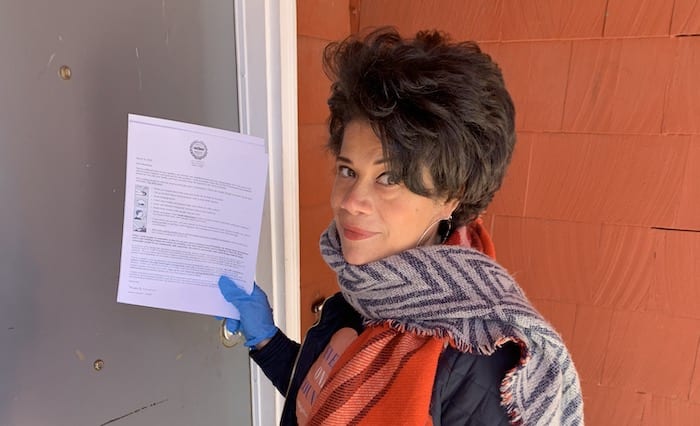
TRANSLATION BY ADRIENNE EVANS
With her first 100 days in office coinciding with the COVID-19 crisis, Boston City Councilor Julia Mejia perseveres in the interest of most vulnerable, disconnected populations
Boston City Councilor-at-Large Julia Mejia is determined to mitigate the suffering caused by the COVID-19 pandemic. Boston’s first Afro-Latina councilor, she has been at the forefront of delivering accessible information to constituents and communicating on various platforms.
Among her efforts, Mejia has worked to ensure that health care screening in a system pressured by stress from the coronavirus does not discriminate. On April 7, Massachusetts released a document, which is still under review, to establish protocols for who receives healthcare and who will not in the event that resources (respirators, medical personnel) are insufficient for all patients.
The “Crisis Standards of Care Planning Guidance for the COVID-19 Pandemic” is a guide in part designed to advise against discrimination. It states: “Factors that have no bearing on the likelihood or magnitude of benefit, including but not limited to race, disability, gender, sexual orientation, gender identity, ethnicity, ability to pay, socioeconomic status, perceived social worth, perceived quality of life, immigration status, incarceration status, homelessness or past or future use of resources, are irrelevant and not to be considered by providers making allocation decisions.”
However, as innumerable politicians, social justice experts, physicians, healthcare personnel, and human rights watchers have stated, significant discrimination still exists against populations that are frequent victims of structural racism. Blacks and Latinos had a shorter life expectancy before COVID-19; now, as more and more data is collected on coronavirus and comorbidities, more stressing statistics can be expected.
In a Boston City Council meeting last week, Councilor Mejia said that African American and Latino communities no longer trust the institutions that are supposed to look after their interests. Over time, she said, those institutions have caused more hurt than help for these populations.
The “Crisis Standards of Care” guide, she said, was created by a committee that seemingly ignored the most vulnerable and unprotected populations. Mejia noted that Black and Latino populations have the highest rates of diabetes, asthma, and other conditions.
Latinos are entering the hospital “with a death sentence,” the councilor explained. “We are already dealing with those things that affect us like a time bomb.”
“Doctors cannot use that system [“Crisis Standards of Care” guide] to decide who they are going to let live and who they are not,” Mejia said. Along with other politicians, the councilor recently signed a letter advocating that the selection system be changed from “years of life” to another, more humane and sensitive measure. She is currently working to “force the hospitals that are in Boston and that do business in Boston” to ignore proposed criteria for “selection for health care” that “discriminate against our people.”
Dedication
Mejia was born in the Dominican Republic and arrived in Boston at the age of five. She’s the first Hispanic woman to chair the Small Business and Workforce Development committee for the City of Boston, and in that role has pushed to help “[provide] financial security to small businesses” during the pandemic.
“I understand these businesses,” Mejia said in a video conference call. She was giving us some background to a new initiative in which the councilor is holding meetings with barbershop and beauty salon owners and workers to create a local industry relief association. “I know them,” she continued. “I use them. The way I am trying to help them has a lot to do with my professional and personal experience.”
Mejia learned English by watching Sesame Street, and played with a dollhouse made from a diaper box. Her mother, Mirta, had an expired visa, and she did not know how to “navigate” the bureaucracy. Mirta knew how to work hard, though, and at age eight, Julia served as an interpreter for her Hispanic neighbors in Dorchester.
“I helped my people and earned money to eat.”
At the age of 12, Mejia helped her mother clean offices at night in downtown Dorchester, an experience that awakened an interest in community activism. After working several jobs and dropping out of school for a couple of years, she eventually returned and cites a lecture by journalist Liz Walker as a life-changing experience.
“The first African-American anchor for a newscast,” Mejia said. “I was so impressed by that story that I managed to graduate and I have always dedicated my life to working with young people because Liz Walker inspired me to be more.”
Combining social commitment with her studies and employment, at the age of 29, Mejia was hired by MTV to cover the 2000 presidential election for the “Choose or Lose” program, designed to encourage young people to get involved in politics and vote. Recalling herself as one of the few reporters who came “from the neighborhood” and had not graduated from Columbia or Berkeley, she focused on under-represented communities.
A few times during our talk, the interview was put on pause so that the councilor could attend to her nine-year-old daughter, Annalise, who was playing in a nearby room. During the pandemic, to strengthen their bond and bring “joy to the people,” they have been making TikTok videos.
“I had not looked for it, but now I am a TikTok sensation,” Mejia joked.
In the midst of crisis response mode, the councilor is encouraged by the success of her Family Relief Fund initiative. A consortium of local groups launched the project with an initial $125,000 goal, but at the time of this reporting had almost reached $200,000. The fund distributes vouchers worth between $50 and $100 to be exchanged for food in the warehouses of the neediest neighborhoods. The idea is to help those who need food as well as small food merchants at the same time.
“This fund was developed because, first, I grew up in poverty,” Mejia said. She started the initiative with the intention of considering cultural traditions. Single Latin mothers, for example, may not have easy access to quarantine food banks during the pandemic, and might not be able to secure essentials “that they know how to cook.”
Mejia continued: “With this fund, we help small merchants, so they can continue to function. … Our small businesses are the ones that suffer the most during times like this … Also to buy more rice, beans, bananas. That … helps people.”
Tonight’s #TikTok was produced by Annalise. You have to watch until the end to appreciate it. Stay safe, positive and grounded! pic.twitter.com/JE9XwOFC2x
— Julia Mejia (@juliaforboston) April 16, 2020
100 days
Though she’s only been in office for a little more than 100 days, Councilor Mejia has presented and worked on major resolutions to guarantee unemployment aid through the pandemic, as well as a resolution aimed at reducing the cost of COVID-19 testing for undocumented and uninsured communities.
Prior to the pandemic, Mejia was the subject of a number of headlines after an anonymous call to her City Hall office included racist insults and threats. She didn’t budge for a moment from the intimidation, and has displayed the same resiliency in the face of COVID-19 fallout.
One of her first resolutions addressed the narrative of Bostonians who associate non-white communities with a lack of resources. “I am super tired that every time they talk about our people they always [point out] the things that we don’t have, that we need,” Mejia said.
“They see us as being poor or that we are always, as they say, in the fight, and it is true, we are always in the fight. But although we are in the fight, we are surviving, and as a community we look for ways to continue. … No matter how poor we are, there are many things we bring to the table.”
I asked: “You had everything against you … You are now a councilor in a city as important in the United States as Boston. Are you not an example of the American dream?”
“The American dream is a nightmare,” she responded.
“For the majority of working people,” Mejia said, “all the effort in the world is not enough in the US and often, on the way, they mistreat and humiliate you.”
Mejia waved her arms at her computer. She often does the same when she is on screen at a press conference at City Hall, and has since she was reporting for MTV. Constituents have a chance to wave back and engage as well; on May 1, Mejia will host a virtual May Day dialogue about the state of labor in Boston during the COVID-19 pandemic. On May 8, she will hold a meeting about food access for those who need it most. On May 15, she will participate in another meeting to promote rapid access to information about the pandemic in languages other than English.
“The city has not done a good job communicating with the Latino community,” Mejia said.
She regrets that since the crisis began, much of the information on the pandemic has been published in English first, with it taking two or three days before a Spanish version comes out.
The councilor continued: “We have many more things than our poverty. I would like people to realize the contributions that we make more than the things that we do not have.”

